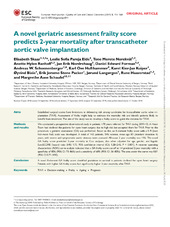| dc.contributor.author | Skaar, Elisabeth | en_US |
| dc.contributor.author | Eide, Leslie Sofia Pareja | en_US |
| dc.contributor.author | Norekvål, Tone M. | en_US |
| dc.contributor.author | Ranhoff, Anette Hylen | en_US |
| dc.contributor.author | Nordrehaug, Jan Erik | en_US |
| dc.contributor.author | Forman, Daniel E. | en_US |
| dc.contributor.author | Schönenberger, Anders | en_US |
| dc.contributor.author | Hufthammer, Karl Ove | en_US |
| dc.contributor.author | Kuiper, Karel Kier-Jan | en_US |
| dc.contributor.author | Bleie, Øyvind | en_US |
| dc.contributor.author | Haaverstad, Rune | en_US |
| dc.contributor.author | Schaufel, Margrethe Aase | en_US |
| dc.contributor.author | Packer, Erik Jerome Stene | en_US |
| dc.contributor.author | Langørgen, Jørund | en_US |
| dc.date.accessioned | 2019-03-18T16:22:32Z | |
| dc.date.available | 2019-03-18T16:22:32Z | |
| dc.date.issued | 2018-10-31 | |
| dc.Published | Skaar E, Eide LSP, Norekvål TM, Ranhoff AH, Nordrehaug JE, Forman DE, Schönenberger, Hufthammer KO, Kuiper KK, Bleie Ø, Langørgen J, Haaverstad R, Schaufel MA. A novel Geriatric Assessment frailty score predicts two-year mortality after Transcatheter Aortic Valve implantation. European Heart Journal - Quality of Care and Clinical Outcomes 2019; 5(2): 153–160 | eng |
| dc.identifier.issn | 2058-1742 | |
| dc.identifier.issn | 2058-5225 | |
| dc.identifier.uri | https://hdl.handle.net/1956/19220 | |
| dc.description.abstract | Aims Established surgical scores have limitations in delineating risk among candidates for transcatheter aortic valve implantation (TAVI). Assessment of frailty might help to estimate the mortality risk and identify patients likely to benefit from treatment. The aim of the study was to develop a frailty score to guide the decision for TAVI. Methods and results We conducted a prospective observational study in patients ≥70 years referred for TAVI during 2011–15. A Heart Team had declined the patients for open heart surgery due to high risk but accepted them for TAVI. Prior to the procedure, a geriatric assessment (GA) was performed. Based on this, an 8-element frailty score with a 0–9 (least frail–most frail) scale was developed. A total of 142 patients, 54% women, mean age 83 (standard deviation 4) years, with severe and symptomatic aortic stenosis were assessed. All-cause 2 year mortality was 11%. The novel GA frailty score predicted 2-year mortality in Cox analyses, also when adjusted for age, gender, and logistic EuroSCORE [hazard ratio (HR) 1.75, 95% confidence interval (CI): 1.28–2.42, P < 0.001]. A receiver operating characteristic (ROC) curve analysis indicated that a GA frailty score cut-off at ≥4 predicted 2-year mortality with a specificity of 80% (95% CI: 73–86%) and a sensitivity of 60% (95% CI: 36–80%). The area under the curve was 0.81 (95% CI 0.71–0.90). Conclusion A novel 8-element GA frailty score identified gradations in survival in patients declined for open heart surgery. Patients with higher GA frailty scores had significantly higher 2-year mortality after TAVI. | en_US |
| dc.language.iso | eng | eng |
| dc.publisher | Oxford University Press | eng |
| dc.rights | Attribution CC BY-NC | eng |
| dc.rights.uri | http://creativecommons.org/licenses/by-nc/4.0/ | eng |
| dc.subject | TAVI | eng |
| dc.subject | Decision-making | eng |
| dc.subject | Frailty | eng |
| dc.subject | Ageing | eng |
| dc.subject | Prognosis | eng |
| dc.title | A novel Geriatric Assessment frailty score predicts two-year mortality after Transcatheter Aortic Valve implantation | en_US |
| dc.type | Peer reviewed | |
| dc.type | Journal article | |
| dc.date.updated | 2018-12-03T13:41:19Z | |
| dc.description.version | publishedVersion | en_US |
| dc.rights.holder | Copyright 2018 The Authors | |
| dc.identifier.doi | https://doi.org/10.1093/ehjqcco/qcy044 | |
| dc.identifier.cristin | 1621534 | |
| dc.source.journal | European Heart Journal - Quality of Care and Clinical Outcomes | |

